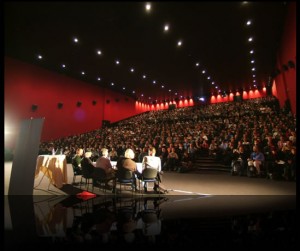Traditionally, in the yearly business cycle, the end part of the year is conference season. All done and dusted by the end of November, so that December parties and holidays can be taken and people can rest, unwind, switch off, with key messages lurking around in the their minds, processed by their sub-conscious for a cracker new year.
From time to time I’m asked to sit with clients to help them think their conferences through. Pull it all together, and bring focus to the key message through speakers, entertainment, physical setting, theme, logos, etc, etc. If you’ve not arranged a conference before, trust me when I tell you that a lot more than you imagine goes into making it a success.
 At the first meeting, when it’s my chance to speak, I ask two questions. Two questions that for me are the only two questions that need to be asked at the beginning of the planning process. It’s from these two questions that the entire conference flows:
At the first meeting, when it’s my chance to speak, I ask two questions. Two questions that for me are the only two questions that need to be asked at the beginning of the planning process. It’s from these two questions that the entire conference flows:
- Who’s conference is this?
- What do they want to say?
Conferences are far more than just a time to get everyone together to connect, drink and have a little business. They represent the one time each year when all the key people (sometimes it’s not everyone) get together into one physical space. They therefore, should be approached with the gravitas they deserve.
Conferences always belong to at least someone. The CEO, the MD, the Sales Director. There’s somebody with whom the buck stops, and that person usually sees the conference as an opportunity to get a very particular message communicated. Sometimes it’s not just one person who ‘owns’ the conference, it’s a committee or a team of people.
Once you’ve identified that ‘someone’, the next question to ask is, “If you could have the delegates leave with just one message, what would that message be?” Once that message has been identified and crystalized everything flows from there. It becomes a tick list to work through with a whole lot of creativity:
- What venue would best support that message?
- What should our theme be?
- What words should we use and not use? (lexicon and un-lexicon)
- What speakers do we need to bring in, if any?
- What entertainment?
- Do we need people to discuss anything?
- Is there music that will support our message?
- Etc, etc, etc
You’d be surprised at how many conferences don’t start in this space. Of course they almost always eventually get to this point, but I do think a lot of time and energy would be saved if this was the starting point.
Of course TomorrowToday can help in this process if you’d like someone to walk it through with you.
Jozi
Durban


